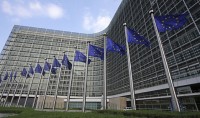EU Asserts Itself on Standards, Takes Position on Ad Consent
February 4, 2022
The European Commission is seeking a more prominent seat at the regulatory table in the hall where global technology standards are being crafted. Experts periodically confer, beyond public view, to establish rules for emerging technology, and the norms for everything from connectivity to artificial intelligence. Now, EU commissioners are concerned they’ll wind up sidelined as a market-dominant U.S. and emboldened China white-knuckle their way to the lectern when groups like the International Organization for Standardization and the UN’s International Telecommunication Union dictate how technology is to be deployed across the globe.
At the ITU’s Plenipotentiary Conference September 26 to October 14 in Bucharest, Romania, the global policy-making body will meet, as it does every four years, to set the Union’s general strategy for four-year plans and elect senior management and other bodies. Having in 2014 been elected to the first of two consecutive terms as secretary general, China’s Houlin Zhao’s top-tier position is no doubt coveted by others.

“We need to make sure we’re not just a standard-taker. We need to be a standard-setter,” the EU internal market commissioner Thierry Breton said in Politico.
In March 2020, the EU adopted its own industrial strategy to further the transition to climate neutrality and digital leadership, as well as defend against rivals from the U.S. and China, deemed unfairly advantaged homes of Big Tech and government subsidies.
“A specific effort by China’s telecoms giant Huawei to change the Internet protocol with a ‘New IP’ initiative, in particular, kicked up concerns in the West in 2020,” Politico reports in an article that quotes Luis Jorge Romero, director general of the European standardization organization ETSI, as fretting that “there has been some shift in the weight of power … Europe is not as prominent as it used to be.”
But neither the EU nor its members are rolling over. The Irish Council for Civil Liberties this week declared victory against Europe’s digital advertising and marketing regulator, IAB, after a ruling on the merits that purveyors of digital ads had been violating principles of the General Data Protection Regulations (GDPR).
“This could have fairly substantial implications for many big tech companies with their own ad businesses, including Google and Facebook, as well as big data companies,” Engadget writes. “It may also have a large impact on many media platforms and publishers on the continent who will now need to address the fallout from the finding. Regulators have also handed down an initial fine of €250,000 to IAB Europe and ordered the body to effectively rebuild the ad-tech framework it currently uses.”

No Comments Yet
You can be the first to comment!
Sorry, comments for this entry are closed at this time.